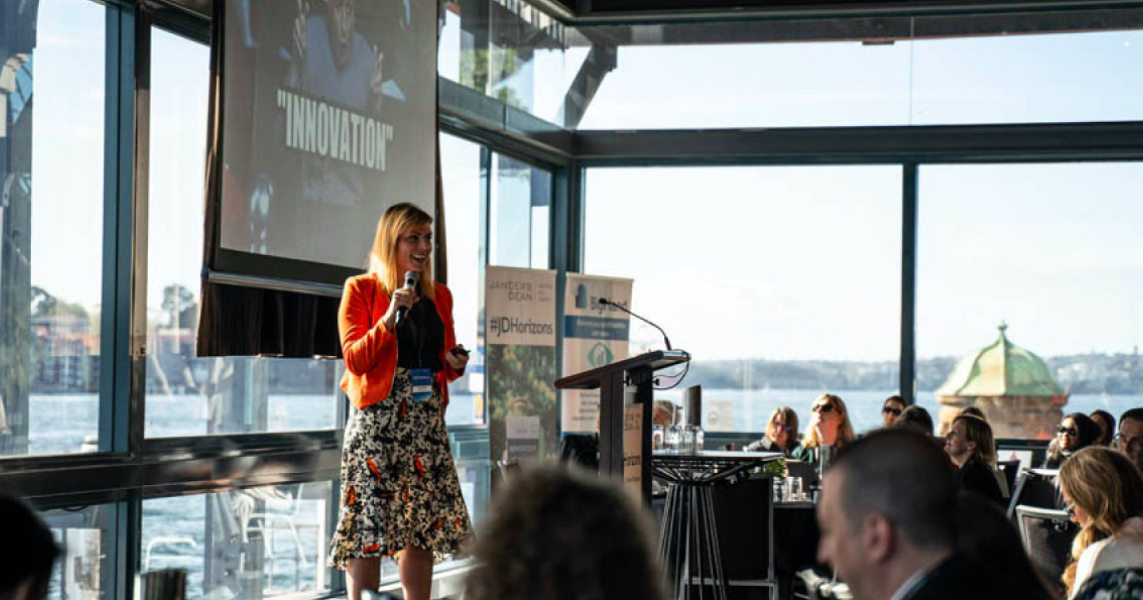London
21.06.2019
Earlier this year, Justin North, the renowned director of Janders Dean, invited Josef along to JD Horizons conference in London to “spend the day with us”. So, in July, I went to the grand Rosewood Hotel in Holborn, London, to see what it was about. The first person I met over coffee was an analyst from a respected legal innovation consultancy in London. In truly direct London style, she said: “I didn’t want to come at first, but my boss said there was no marketing bullsh*t, so I thought I’d give it a go.”
From the moment I walked into the ballroom, complete with a power ballad blaring at 8:30 am, I thought I was in for something a little different. (And, in-line with my new friend’s observation, there was also a pill bottle on the table which said on the label: Super B+ – Easier to swallow than artificial press release bullshit.)
Below is a list of the top three speakers from both the London and Sydney conferences and their key messages.
Meredith Williams-Range of Shearman & Sterling LLP told a story that many of us in the legal profession are familiar with. “There were great years of growth over and over [at the firm]. But then they started getting smaller.” Meredith spoke to a number of causes of these diminishing returns, including that only 45% of work from in-house departments is now going to law firms.
The answer? Look to client value. Meredith’s tip for doing this was to focus on “inefficiency, write-offs and write-downs.” By this she meant find the areas of the business where clients don’t see value – the evidence being that the bills are written down or written off – and focus on fixing them. Once you’ve identified these problem areas, she implored us to “always start with process”, including process documentation, process change and new process development.
Though Meredith observed that 20-25% of lawyers are terrified of change, her ultimate message was a hopeful one: “Legal tech will make us better and faster lawyers.”
One of the organisations that we’ve worked with since the start of Josef was speaking at the London event. Kate and Chris from Justice Connect, inarguably one of the most innovative and forward-thinking community legal centres in the world, presented on their recent Legal Gateway project, which combines automated intake and referral of pro bono matters. What stood out most to me on the day was this: since launching the first phase of the project, they are seeing “22-44% efficiency gains.” It was so refreshing to hear from people who have already done the work, and are already seeing results.
The final of my favourite speakers from the London conference was Catherine Wallwork from Deloitte Ventures. And I wanted to include her in my top three because she made a simple but very powerful point. Her question was: “How do we create an innovative culture?” So many of the firms and organisations we work with grapple with this question. Her answer? “The number one reason people don’t innovate is time.” No matter how good the tech is, if we don’t consciously make a commitment of time and resources, we are not going to get very far.
At the Sydney conference, Natasha opened her talk with a story about her mother who thought that “buggered” was a terrible word. “Well, Mum, I’m sorry but I’ve got something to tell you,” she said. “I’ve been using the F word a lot lately. And I’ve got a feeling it’s not just me. We’re all struggling with digital transformation.”
Natasha’s expertise is in blockchain, and she spoke of the obstacles to implementing blockchain in the legal industry in a real and tangible way. For her, the technology is no longer the issue. Rather, the obstacles relate to how that technology will be applied to real situations and processes. For example, she called out the “usability” of blockchain as one of the obstacles. “If it works but people can’t use it, they won’t.”
Jules Miller spoke from a different perspective to the others at the conference. She is a tech entrepreneur and now a venture capitalist who makes decisions about where to invest in the legal tech space. One of the parts of her talk that has stayed with me was her advice on how a law firm should invest in legal technology and innovation. She referred to McKinsey’s Three Horizon’s of Growth paradigm. This theory proposes that organisations should invest their time and effort in three tranches:

The final speaker on my list from Sydney is Kim Lewis from Gilbert + Tobin. Kim drew a surprising but powerful correlation between our struggle to stop climate change and our struggle to move the legal profession forward. On the negative side, she drew parallels between: the fact that fatigue is often the result of incessant talk of crisis; that there are vested interested in maintaining the status quo; and that it is hard to communicate something so complex and uncertain. But, on the positive side, she also drew parallels between: the grass-roots movement for change; the fact that there is global action on the issue; and that there is already measurable and visible impacts being seen. What were her learnings? First, use visible and tangible results to raise awareness. Secondly, give hope and help the people involved in this transformative process.